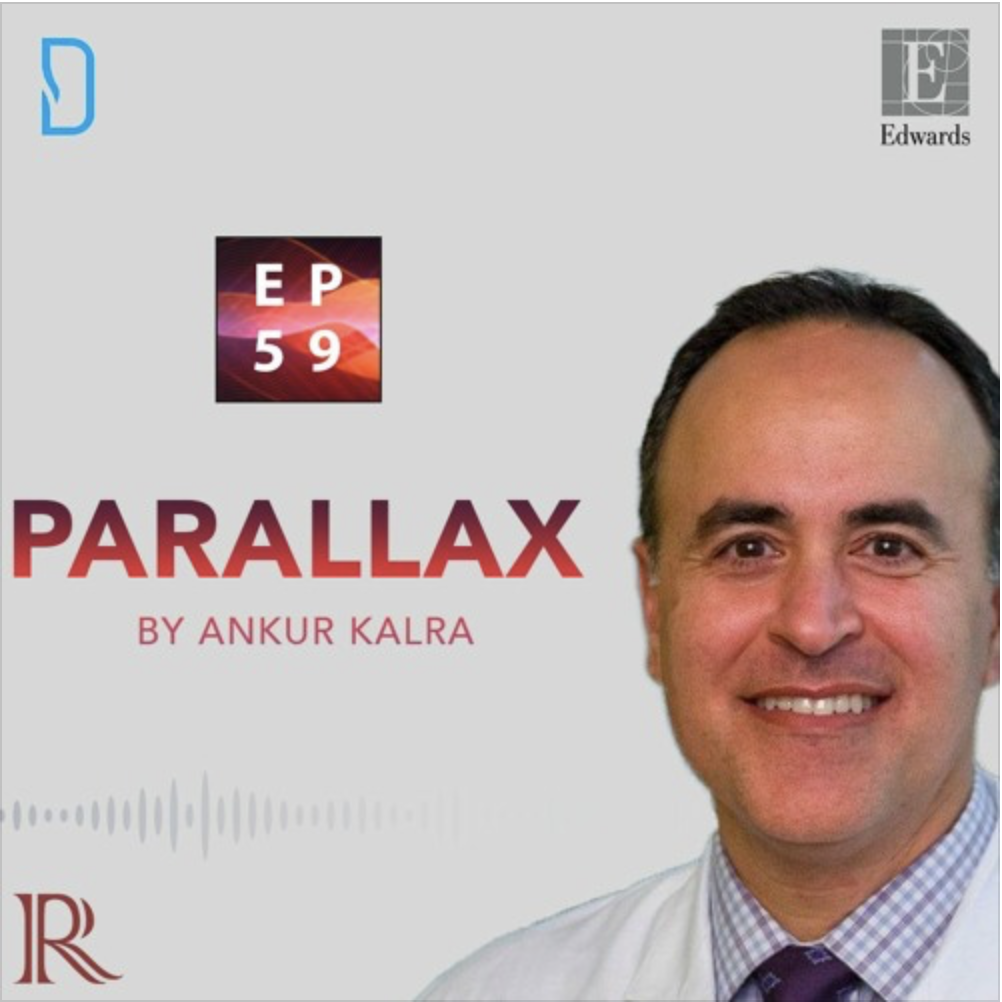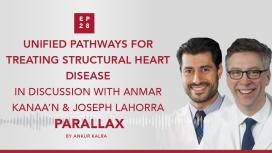
In this AHA 2021 episode of Parallax, Dr Ankur Kalra’s guest is Dr Amit Khera, Professor and Director of Preventive Cardiology at UT Southwestern Medical Center, Dallas and Vice Chair of the Scientific Sessions.
For this week’s show, Dr Khera selected three thought-provoking late-breaking trials that will inform or change clinical practice. Ankur and Amit discuss how the AVATAR trial will influence guidelines, and whether these findings could be translated to TAVR. Most importantly, they discuss how AVATAR’s results could inform patient decisions.
Next, Dr Khera highlights a randomized trial that was designed to address the needs of a larger population. The China Rural Hypertension Control Project offers exciting insights and an innovative framework for relying on social healthcare work.
Lastly, Dr Kalra and Dr Khera discuss a trial that investigated the LDL-cholesterol lowering efficacy of MK-0616. This oral PCSK9 Inhibitor may open the door for more patients in the future.
What were the key findings? What are the take-home messages? How will these 3 trials foster new opportunities for patients?
Trials covered in detail include:
• Aortic Valve Replacement versus Watchful Waiting in Asymptomatic Severe Aortic Stenosis: The Avatar Trial
• A Cluster Randomized Trial of a Village Doctor-Led Intervention on Blood Pressure Control: China Rural Hypertension Control Project
• The Clinical Safety, Pharmacokinetics, and LDL-Cholesterol Lowering Efficacy of MK-0616, an Oral PCSK9 Inhibitor
Questions and comments can be sent to “podcast@radcliffe-group.com” and may be answered by Ankur in the next episode. Guest @dramitkhera hosted by @AnkurKalraMD. Produced by @RadcliffeCARDIO.
Brought to you by Edwards: www.edwardstavr.com

Brought to you by Edwards: www.edwardstavr.com


What do you need to know about hospital investigations? What is the difference between OPPE and FPPE? How can you get educated on hospital bylaws and processes?


Rohin shares an advice that he received at the beginning of his career: “If you can deal with an average day, the exciting day will take care of itself.”
Ankur asks Rohin about Medlife Crisis and the work that goes into producing a show followed by 500K people. Rohin reiterates his passion for research and science communication. Ankur and Rohin discuss what it means to be yourself on social media and what is Rohin’s advice to our early-career listeners.

In this information-packed episode, Dr Patel takes us behind the scenes and talks about the work that goes into the curation of the programme and the considerations that shape the event. Dr Kalra asks Dr Patel about his highlights over the years and the movement and changes that he observed as vice chair and chair of the event. Dr Patel elaborates on the key late-breaking science trials in 2022. Dr Kalra and Dr Patel discuss the grading system of the award applications and share some useful information with our listeners.

Exploring Art & Advancement Within Medicine - A Conversation with an Interventional Cardiologist.

Dr. Ankur Kalra invites Dr Salim S Virani to help simplify the concept of Lp(a) with answering key questions about its measurement and its place in practice and prevention.


Dr Khan talks about education in the US and his decision to move back to Pakistan. Ankur asks Sohail about his new professional home: NICVD, a free clinic providing primary heartcare for Pakistanis. They discuss some of the innovations Dr Khan works on to improve patient care that utilise simple but effective interventions. We learn more about free screening clinics and about Dr Khan’s work on the largest ever study in Pakistan on association of Lpa and CV disease in South Asians.



In this week’s Parallax, Dr Kanaa’N, the director of the program, and Dr Lahorra, chairman of the Heart, Vascular & Thoracic Department of Akron General introduce the listeners to the foundations of their program and the paradigm shift brought by TAVR.

Ankur Kalra asks Grant W Reed, Director of the Cleveland Clinic’s STEMI program, to reflect on the actions they took and the challenges of delaying cardiovascular procedures in the wake of the coronavirus pandemic. Dr Reed offers insight on the factors that influenced the Cleveland Clinic’s STEMI policy for COVID-19. Ankur and Grant discuss the triage considerations for patients with structural heart disease and the steps the clinic took to protect its healthcare workers.

In this edition of Parallax Dr Kalra asked Dr Rosenbaum about the influences that shaped her choices as a writer and as a healthcare professional. Dr Rosenbaum opens up about her childhood and how she connected to her grandfather through writing and medicine. We learn about Lisa’s first day at medical school and her latest writing project.

Jagmeet P Singh, associate chief of the cardiology division at Massachusetts General Hospital and professor of medicine at Harvard Medical School joins Ankur Kalra for a deep conversation about his journey across three continents. Dr Singh talks about the importance of choosing fulfilment over success. We gain more insights on the recent late-breaking trial, MADIT-CHIC focusing on cardiac resynchronization therapy. Ankur asks Jag about his experience of being on the other side of the healthcare system and his enrolment in the since halted remdesivir trial.

Prof Michele Senni is Director of Cardiology at Papa Giovanni XXIII Hospital, Bergamo Italy. He contracted COVID-19 himself and in this latest podcast he meets with Ankur Kalra, MD to discuss his personal experience in dealing with patients and COVID-19 in Europe’s outbreak epicentre.
Hear them discuss the burden on healthcare, patient selection, the importance of testing and PPE and how COVID has resulted in a reduction of acute myocardial infarction and heart failure in patients.





